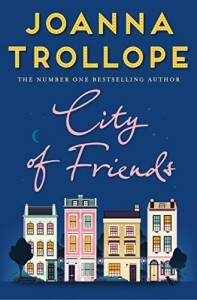
The premise for Trollope’s 20th novel interested me: four women, friends since university, now in their forties are successful in high-power careers, yet they are all struggling with work-life balance. The story begins with Stacey, a senior partner at a private equity firm, requesting flexible time in order to care for her mother who is suffering from dementia. Stacy, her husband, and her friends are confident she’ll get it given all she has done for the company. Instead she is fired.
Stacey finds herself on a park bench having a meltdown. Who is she without her job?
Two of her friends— Melissa, a management consultant who owns her own business, and Beth, an author and academic expert on business psychology—decide that their fourth friend Gaby, an investment banker, should give Stacey a job. Never mind how becoming an employee and employer would upset the relationship between Stacey and Gaby, not to mention a deeper betrayal that lurks on the horizon.
All four women have families, each a different constellation: Stacey with a husband and no children. Gaby with a husband and three children, Melissa single with one child, and Beth with a partner, a young woman with whom she’s bought and refurbished a house.
I was looking for insight about women surviving the clash of career work with domestic work. That’s not what this is about. The two husbands and the partner take care of domestic chores, other than caring for Stacey’s mother. All the families are quite wealthy, which cushions the domestic crises that affect all four.
Instead it is about the difficulties encountered by women like these four who, while loving their families deeply, find their greatest satisfaction in work. Although men are assumed to feel this way, few women—even today—will admit to it. I was interested in seeing how these very privileged women managed to navigate these shoals.
Unfortunately, I had trouble keeping straight which was which. They sounded much alike, not surprising in longtime friends, but challenging to a reader. My other difficulty was their idealised situations. Here, teens might be sulky but also bring you flowers and cook you dinner. Husbands, who are very minor characters indeed, don’t kick up a fuss or resent their work-obsessed wives, who themselves succeed in their work almost effortlessly.
Still, it was a pleasant, easy read. And we certainly need more stories challenging society’s continuing biases about women’s lives. We also need more stories about our working lives; they absorb so much of our time and energy and attention, yet are too often sidelined in favor of domestic dramas.
What novel have you read about today’s working life?
